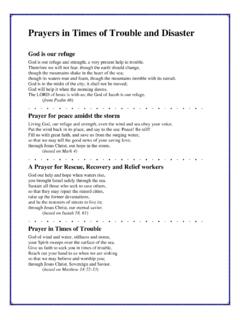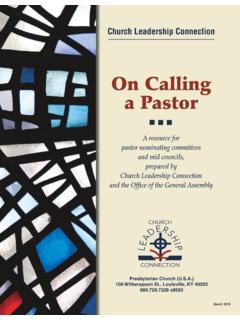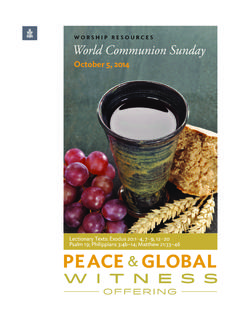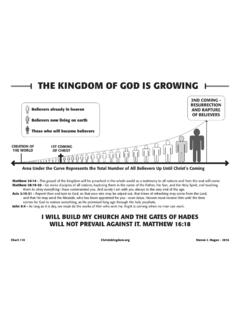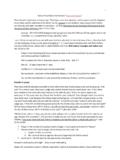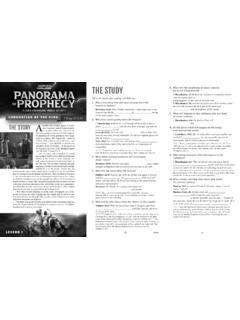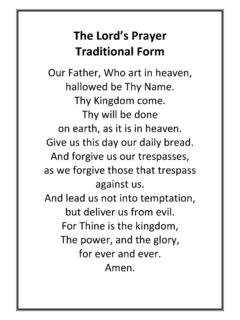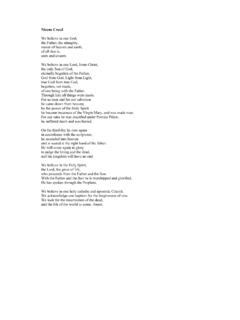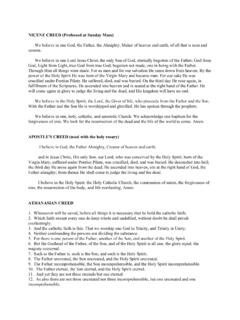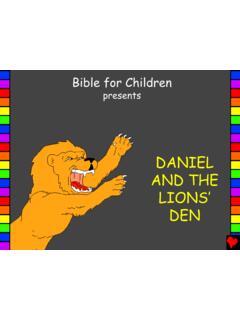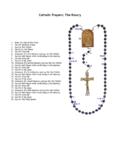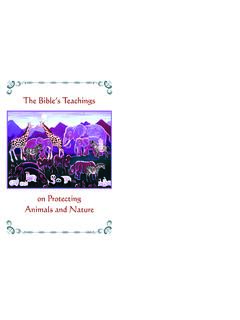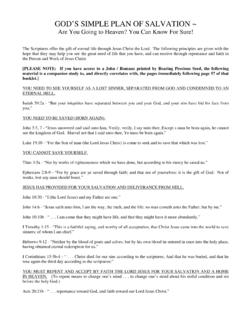Transcription of A DECLARATION OF FAITH Chapter One - The Living God
1 A DECLARATION OF FAITH Chapter One - The Living God (1) We believe in one true and Living God. We acknowledge one God alone, whose demands on us are absolute, whose help for us is sufficient. That One is the Lord, whom we worship, serve, and love. (2) God is greater than our understanding. We do not fully comprehend who God is or how he works. God's reality far exceeds all our words can say. The Lord's requirements are not always what we think is best. The Lord's care for us is not always what we want. God comes to us on his own terms and is able to do far more than we ask or think. (3) God makes himself known in Jesus Christ. Jesus' involvement in the human condition is God's involvement. His compassion for all kinds of people is God's compassion. His demand for justice, truth, and faithfulness is God's demand. His willingness to suffer rejection is God's willingness. Jesus' love for the very people who reject him is God's love.
2 (4) God moves in history with his people. Jesus Christ stands at the center of the biblical record. The Bible is the account of God's word and action in history, together with his people's response in FAITH . It tells how the Lord has moved with Israel and the church towards the kingdom of God, his just and loving rule over all. It is the story of the one God, who is the Father, the Son, and the Holy Spirit. That story is still unfolding and in FAITH we make it our own. It forms our memory and our hope. It tells us who we are and what we are to do. To retell it is to declare what we believe. (5) God is at work beyond our story. We know that God is not confined to the story we can tell. The story itself tells us God works his sovereign will among all peoples of the earth. We believe God works beyond our imagining throughout the universe. (6) We acknowledge no other God. We must not set our ultimate reliance on any other help.
3 We must not yield unconditional obedience to any other power. We must not love anyone or anything more than we love God. (7) We praise and enjoy God. To worship God is highest joy. To serve God is perfect freedom. Chapter Two - the Maker and Ruler of All (1) God created and rules in love. God created all the worlds that are and upholds and rules everything. We affirm that the universe exists by the power of God's Word and Spirit. God has chosen to give it reality out of the love we have come to know in Christ. God still works through the processes that shape and change the earth and the Living things upon it. We acknowledge God's care and control in the regularity of the universe as well as in apparently random happenings. There is no event from which God is absent and his ultimate purpose in all events is just and loving. That purpose embraces our choices and will surely be accomplished.
4 The Creator works in all things toward the new creation that is promised in Christ. (2) God sustains the goodness of creation. God called all he had made good. We declare that the universe of matter, energy, and life is God's good creation in all its parts. Even though evil has emerged within God s creation, we may work and play in it and explore it with wonder and joy. Evil is whatever works against the loving purpose of God for human beings and all creation. Natural forces may have evil effects. Sinful human choices produce evil results. Evil may become institutionalized in our social structures. The power of evil to hurt and destroy, to cut off the possibilities of full human life, calls into question the power and goodness of God. Whether we understand evil personally or impersonally, we cannot explain how it originated in a world made good. But we can affirm that evil is God's enemy as well as ours.
5 In Christ, God shared our agony over evil and broke the back of its power by bearing the worst it could do. God works continually to overcome evil. In the end it will be utterly defeated. Therefore we have courage to endure evil, to learn from it, and combat it. (3) God made us to care for other created things. God made human beings along with all the other creatures and charged them to care for the earth and all that lives on it. We acknowledge we share in the interdependence that binds together all God's creation. Yet God gives us power to rule and tame, to order and reshape the world. We hold the earth in trust for future generations of Living things. The Lord forbids us to plunder, foul, and destroy the earth. The Lord expects us to produce, to consume, to reproduce in ways that make earth's goodness available to all people and reflect God's love for all creatures. The Lord bids us use our technical skills for beauty, order, health, and peace.
6 (4) God made us for life in community. God created human beings with a need for community and with freedom to enter into it by responding to their Maker with grateful obedience and to one another with love and helpfulness. We believe that we have been created to relate to God and each other in freedom and responsibility. We may misuse our freedom and deny our responsibility by trying to live without God and other people or against God and other people. Yet we are still bound to them for our life and well-being, and intended for free and responsible fellowship with them. Since every human being is made for communion with God and others, we must treat no one with contempt. We are to respect and love all other people and ourselves as well. (5) God made us male and female. God made human beings male and female for their mutual help and comfort and joy. We recognize that our creation as sexual beings is part of God's loving purpose for us.
7 God intends all people - whether children, youth, or adults, single, divorced, married, or widowed to affirm each other as males and females with joy, freedom, and responsibility. We confess the value of love and faithfulness and the disaster of lust and faithlessness in all our associations as women and men. Our creation as males and females must not serve as a pretext for dominating, hurting, betraying, or using each other, for denying anyone's rights or rewards or opportunities to develop potential to the full. We believe that marriage is a good gift of God. The covenant of wife and husband to love and serve one another faithfully is intended to reflect the faithfulness of God. God gives us the gift of sexual union to be the sign of that mutual and lasting covenant and a means whereby we may share in creating new life. If married partners become parents, their care for their children is intended to reflect God's love and discipline.
8 When we fail each other as parents or partners, we are called to forgive each other as God forgives us and to accept the possibilities for renewal that God offers us in his grace. (6) The human race has rejected its Maker. Though they were made to be like God, man and woman broke community with God, refusing to trust and obey him. Their community with each other was broken by shame and murder, lust and pride. We confess that in all generations men and women have rejected God again and again. At times we seek in pride to become gods, denying the good limits that define us as creatures. At other times we draw back in apathy, refusing to fulfill our human responsibilities. The antagonisms between races, nations, and neighbors, between women and men, children and parents, between human beings and the natural order, are manifestations of our sin against God. Chapter Three - God and the People of Israel (1) God chose one people for the sake of all.
9 To the world in its rebellion and alienation God promised blessing and restoration. The Lord chose Abraham and his descendants as bearers of that promise for all peoples. They had done nothing more than others to deserve the Lord's favor, but God loved them and made them his own. We acknowledge God's freedom and grace. Though we are unworthy, the Lord has made us his own in Christ. God has chosen us as his servants for the sake of the world and destined us to be his daughters and sons, giving us love and life, calling us to worship and honor him. (2) God delivered his people. When Abraham's descendants were slaves in Egypt, God heard their cries and prayers. God remembered his promise and sent Moses to free them from bondage. We declare God's steadfast love and sovereign power. The Lord can be trusted to keep promises. The Lord still acts in the affairs of individuals and nations to set oppressed and persecuted people free.
10 (3) God bound his people to himself in covenant. Freed slaves became the people of God when they accepted the Lord's covenant. God charged them to respond to his rescuing love by obeying his commandments. Their life together was to express the justice and compassion of their holy God. Since we, too, are the Lord's covenant people, we know we must be holy as the Lord is holy. We must keep God's commandments, not in order to earn or compel the Lord's favor, but to reflect the character of God and to be his grateful and loving people. (4) God blessed and judged his people. The Lord's care sustained the people of Israel. God gave them a land where they could celebrate his goodness. The Lord established their kingdom and promised a ruler from the line of David to reign in justice and peace. When God's people worshiped the gods of the land, when they put their trust in military alliances, when they failed to do justice and oppressed the poor, God sent the prophets to condemn their sinsand to call the people back to obedience.
